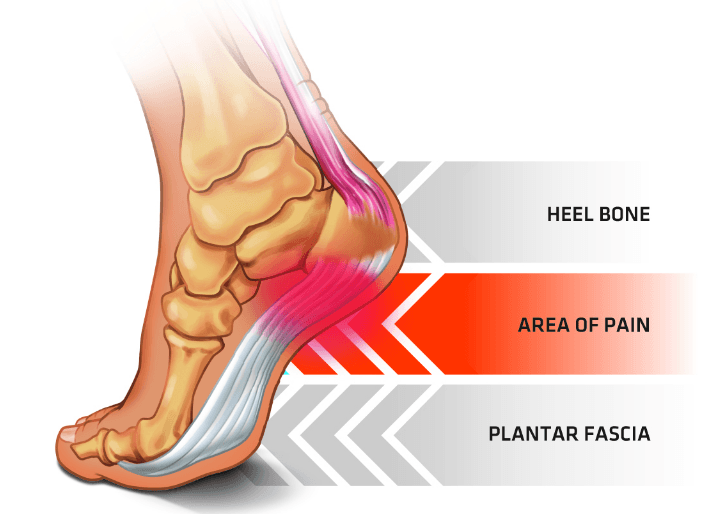Plantar Fascitis is the most common cause of heel pain in adults. It often occurs as a result of repetitive use or excessive load on the fascia of the foot. The fascia is a band of connective tissue beneath the skin which acts as a shock absorber, attaches and stabilises different segments in the foot. For a long time, plantar fasciitis was thought to be an inflammatory process but recent research is showing that it may be a degenerative process.
Plantar fasciitis can either be caused by traction or compression injuries.
Traction plantar pain is caused by repeatedly stretching or overstretching the plantar fascia. Commonly, those with elongated arch due to poor foot biomechanics or weakness of foot arch muscles would have traction plantar fasciitis.
Compression plantar fasciitis is usually associated with trauma due to a penetrative injury or a bruising injury when one steps or lands heavily on an object.
There are contributory factors to the occurrence of plantar fasciitis or plantar hell pain some of which are
- Flat foot
- Excessive foot pronation
- Impact or weight bearing activities such as prolonged standing or running
- Improper shoe fit
- Metabolic conditions such as Diabetes Mellitus
- Elevated BMI
- Loss of ankle dorsiflexion
Symptoms of Plantar Fasciitis
- Gradual onset of pain at the bottom of the foot
- Pain is usually worse in the morning when taking first steps or after sitting for long
- Tenderness over or around the medial malleolus or calcaneous, which is the inner side of the ankle
- Limping when walking
- Pain increases when there is passive stretching of the toes.
Treatment of Plantar Fascitis
There are phases in the treatment of foot pain or plantar fasciitis
- Rest, Ice and Protection
- Get full range of motion
- Restore arch muscle control and foot biomechanics
- Footwear and gait analysis
- Restore normal muscle control and improve running technique
For some individuals, a simple technique such as resting the foot and then rolling your foot over a rolling pin may provide relief. In some cases, specific type of exercises, taping, stretching, strengthening and use of orthotics such as night splints may be required. The pain may last up to 6 months in some individuals but the good news is that up to 90% of foot pain is resolved by conservative treatment.
Do you have more questions? The PhysioCraft team would be happy to answer any questions you have for FREE. Give us a call on +2348035670888 or +2348171940921

